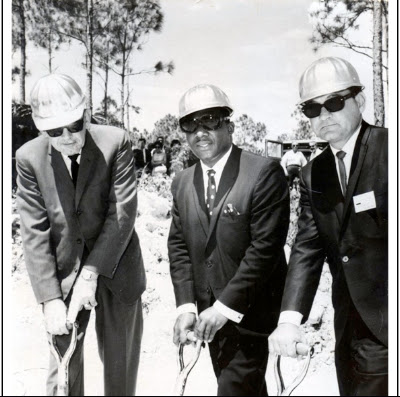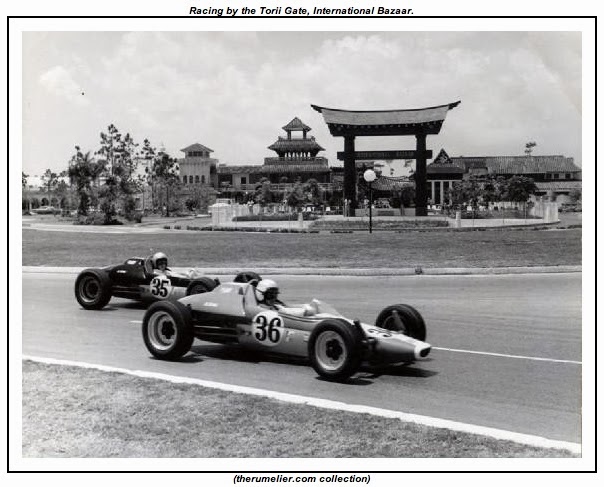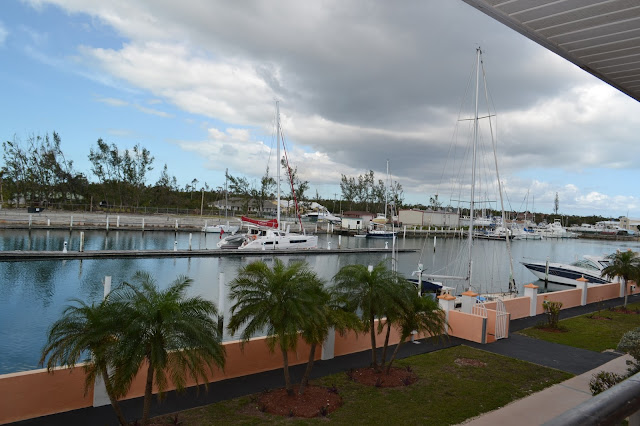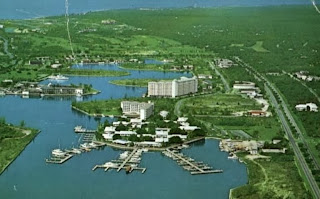"Bend or Break speech"
"Bend or Break speech"
On July 26, 1969, Sir Lynden O. Pinding, then Premier of The
Bahamas, delivered this speech during an inspection tour at the official
opening ceremony for the new Bahamas Oil Refinery Company (BORCO). This speech in history has been called the "Bend or Break Speech" and has long be said by officials in Grand Bahama to be the reason the lights went out at the "Magical Fair" that was the spark called Freeport.
Here is the entire speech:
“I am certainly delighted to be here this morning because
what I see beginning on this site is not only the erection of an oil refinery
but also the real true birth of a petro-chemical industry in the Commonwealth
of The Bahamas Islands. I am delighted to be here because, if the industry
develops as the proprietors hope it will be and I hope it will, not only will
The Bahamas be able to meet from within its shores its own presently small
needs of kerosene, gasoline, diesel and other fuel oils, but a most valuable
export product will go forth to the world as a substantial earner of hard
currency.
“It will be years yet, I know, before this ultimate objective is attained but all of us are looking years ahead, aren’t we?
“When completed this will be the second heavy manufacturing
and processing industry to have been established in The Bahamas. The first was
the cement plant now in production just a few miles from here, and which,
together with this projected oil refinery, will have established a true base on
which industrialization and diversification can proceed.
“So far, I have had nothing but the most cordial
relationship with the owners of the enterprise. Early in 1967, a met Teodora
Moscoso, a most distinguished gentleman from Puerto Rico, who outlined to me
what was then being completed. He emphasized that it was the Company’s policy
and desire that the Company’s plans would fit into the Government’s development
programme, and that the proposed to work in complete accord with the
Government.
“I have also met with representatives of New England
Petroleum Corporation and Standard Oil Company of California who have repeated
the early stand taken by Mr. Moscoso.
“When on a holiday visit to Puerto Rico in early 1968, I had
occasion to visit the refinery of Commonwealth Oil of Puerto Rico and was
impressed with its efficiency and with the overwhelming number of Puerto Ricans
that were engaged at all levels in the refining operation. It took time to
reach that situation in Puerto Rico and will take time here, but knowing it is
done in Puerto Rico augers well for the future that it will be done in The
Bahamas too. Indeed I have already been informed that this Company has agreed
to offer four university scholarships in science or engineering as part of
their progremme to ready Bahamians for the top jobs in this plant. Degrees in
chemistry and mechanical engineering will be valuable assets in this
undertaking.
“I therefore offer my hearty congratulations to Bahamas Oil;
I wish them every success in their undertaking: I wholeheartedly welcome them
as honest partners in the continued economic development of the Bahamas
Islands: for I believe that the objectives of this Company includes the basic
tenets expressed by the Minister of Development in the lines with which I
opened my remarks.
“I wish I could have said the same about all enterprises
here in Freeport. There are many people in The Bahamas who are participants in
and interested in the economic development of The Bahamas. Not all of them,
however, are cognizant of or interested in the economic and social welfare of
Bahamian people. Far too few acknowledge and fewer still accept the fact that
development must be shaped to fit the human and social needs of the country
where it takes place.
“Far too may here adopt the attitude that they are guaranteed
rights to make money and that is all that matters. Freeport has indeed been a
miracle of economic development: it has indeed been a shining example of
financial wizardry. What it lacks is humanity; what it needs is a social
conscience: what is must have before too long, is a soul.
“I have always been concerned about this lack of a soul in
Freeport; the absence of honest concern for the human and social needs of
people. I was so concerned in the days when I stood alone. I had hoped that an
early change would have been evident by now but I have been severely
disappointed.
“It is a fundamental part of my basic political philosophy that people
are more important than things; that men are more important than machines. In
this City where, regrettably almost anything goes, where, promisingly, some
economic opportunities have come to Bahamians, Bahamians are nevertheless,
still the victims of an unbending social order which, if it now refuses to
bend, must now be broken.”
“It is abundantly clear that to developers in this area
Bahamian people do not matter. For instance, one set of developers have built a
system of canals surrounding an old Bahamian Community. Traditionally, the area
had fresh water, which amply supplied local needs. But the canals have
apparently burst the fresh water lenses and the ground water in the area is now
sour. There is no way that the water lenses can be repaired so, since ancient
water rights have been disturbed, piped water should be supplied to the area.
It should be supplied to the local public free of charge, and there should only
be a charge in the event of a house being connected to the main supply.
“Since the surrounding canals were dug through, what was
once a swash of sawgrass, the land had to be built up above the high water
mark. The traditional community, which now lies between high sand ridge on the
ocean front that the new high land built between the canals, is a pond whenever
there is heavy rain.
“The most serious aspect of the socio-economic life in
Freeport is the appalling situation now prevailing in housing. Freeport is a
well-planned city – so well planned in fact that it appears that it was
intended to plan the Bahamian right out of it. I had very much hoped that the
events of the last few years would have been sufficient to impress on
developers, apartments owners and real estate agents that I could not stand
idly by and watch a haven of economic success spring up in Freeport and ghettos
develop around it; I had very much hoped that serious steps would have been
taken to solve the long-standing problem of housing Bahamians here, but these
hopes have been dashed to the ground.
“Ever since the Representative for Grand Bahama reported to
me in February last the Matson incident, I have been quietly investigating the
housing situation here. I have had investigated the recent complaints against
Drummond Realty International Limited and Graham Associates, and I had no doubt
that the report in each case was substantially correct. It appears all too
clearly that house and apartment owners give instructions to estate agents not
to sell or rent to “dark” Bahamians; that rents in Freeport are kept artificially high to out-price the
ordinary Bahamians; and that agents voluntarily are going along with this
vicious game.
“I cannot believe those of you who have substantial
investment in Freeport either want or approve of this state of affairs. I
cannot believe that those of you who are decent and honourable will allow
fly-by-night, get-rich quick, speculators to spoil the whole barrel of sound
apples. I cannot any longer take anybody’s word that they are going to do
something about it: I will have to do something about it myself.
“I am told that there are a number of empty apartments in
Freeport. If that is so, let us see how long they remain empty. If the law of
supply and demand operates in the rental business here, then the prices should
soon come down and be within the reach of ordinary Bahamians. The tragedy is of
course that the building boom was not really intended to take account of the
housing need of the ordinary Bahamian in Freeport.
“The question of the desirability or undesirability of the
companies, owners, and agents involved is now a material part of the
investigation which will be concluded soon. Builders-Investors are to know from
today that they should not build if they do not wish their apartments rented to
black Bahamians: agents are to know that from today that any such instructions
from owners are inoperable: and everyone should know from today that anyone who
does so is a persona non grata as far as this Country is
concerned and can play no useful part here.
“I cannot help but feel that, if there were more Bahamians
engaged in the real estate business, most of this foolishness would have ended
long ago. This might well mean that apartment building figures might be less
spectacular but it will certainly mean a reduction in the chances of an
explosion.
“Another area of discrimination here is the entertainment
field. When they come to Freeport, everyone looks for Bahamian music and
entertainment but the proprietors of places of entertainment have other ideas.
There are indications that some places want particular kinds of bands because
they wish to create a certain atmosphere. There may well be truth in this
because I have already seen a clause in a license whereby a store couldn’t hire
anybody if they didn’t have Northern European features: Perhaps there are
clauses which indicate where bands and entertainers come from.
“Let the words go forth that contract clauses like that will
not be enforceable in these Bahama Islands; they are against public policy and
so they can be forgotten. Let it be repeated that our development objectives
are directed towards opening u greater economic and social opportunities for
the Bahamian Citizen … In order to achieve these objectives, the development
programme must be shaped to fit the economy in which it is operating. The
character and soul of this community must be Bahamian.
“On our part, I am satisfied that the existing facilities of our law enforcement agency are inadequate to cope with what is already here and the expected continued orderly growth. It is also clear that the influx of so many people from so many parts of the world has demanded a high degree of sophistication. It is our hope therefore, to provide the Island of Grand Bahama with the type of police protection that it deserves and to this end the establishment here will be increased by another 50 men before the end of the year, the supernumerary policy will in the meantime be disbanded.
“The voluntary fire-service in Freeport will be taken over
by the Police, a mobile division will be established and the investigative and
intelligence branches will be boosted up. A brand new top level officer will be
placed in over-all command and his job will be clearly and specifically defined
to clean up this city. At the same
time, other agencies of the Government will get much needed personnel
assistance.
“As we form new partnerships in the development of the
Bahamian economy, as we strive toward developing a truly fine mixed Bahamian
society, let me emphasize that there is room for all men of goodwill. There is
no room for the rest.”
Sir Lynden O Pindling as Premier in 1967 at the opening of the Grand Waterway in Freeport.
(We want to say thanks to Mr. Spencer Mallory of Island Treasures Real Estate for lending his copy of The Freeport News for this piece. Thanks to The Freeport News for reprinting this in the 50th Year Anniversary of Freeport back in 2005. Also again thanks to oldbahamas.com where you can go to purchase these photos if you desire in good quality resolution. Check out their pages http://www.google.com/imgres?imgurl=http://www.oldbahamas.com/sitebuildercontent/sitebuilderpictures/LucayanWaterway.jpg&imgrefurl=http://www.oldbahamas.com/id34.html&usg=__VV25T9PrtkB6NhY12VgIGQ69AbQ=&h=850&w=687&sz=146&hl=en&start=6&sig2=zv-YtrfvgxDVACFsYRBlqg&zoom=1&tbnid=G9xfvc_im4ARAM:&tbnh=145&tbnw=117&ei=jmtxUvnXJYXLsQTg6ICAAw&prev=/search%3Fq%3Dopening%2Bof%2Bborco%2B1969%26um%3D1%26client%3Dsafari%26sa%3DN%26rls%3Den%26hl%3Den%26tbm%3Disch&um=1&itbs=1&sa=X&ved=0CDYQrQMwBQ.)





Comments
Post a Comment